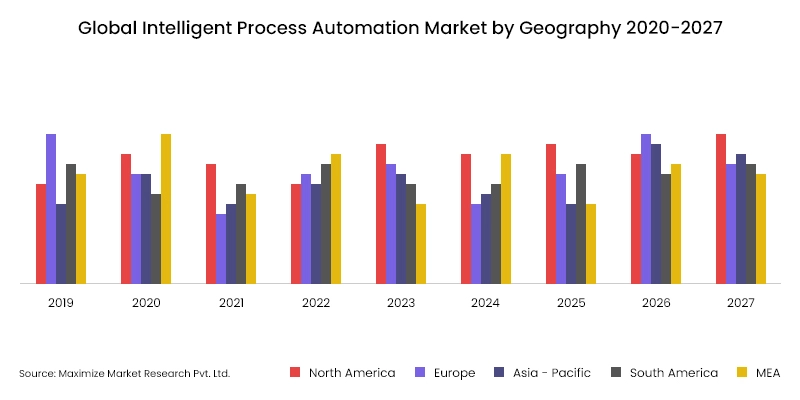- Blog
- April 4, 2022
Intelligent automation: Driving force in automation innovation

- Blog
- April 4, 2022
Intelligent automation: Driving force in automation innovation
Legacy systems restrict technology innovation by leaving little room for new technologies to be implemented. To offer the disruption that so many businesses require, demand for a platform that acts as an intelligent information forklift is increased. They need a platform that works with legacy systems and can be readily adjusted. According to Maximize Market Research, the Global Intelligent Process Automation market will grow at a 12.8 percent annual rate over the next five years, reaching approximately 22.26 billion USD by 2027.

What is Intelligent Process Automation?
Intelligent process automation(IPA) is a new collection of technologies that combine basic process redesign, robotic process automation, and machine intelligence into a single package. It’s a collection of business-process enhancements and next-generation tools that help knowledge workers eliminate monotonous, repeatable, and regular chores. IPA imitates human activities and learns to enact them even better over time. Because of improvements in deep learning and cognitive technologies, traditional rule-based automation mechanisms are supplemented by decision-making capabilities.
Automation is becoming a more important and relevant business need. Yet terms like “robotic process automation” ” Intelligent process automation ” and “artificial intelligence” can be confusing and easily fall into the category of jargon.
Intelligent process automation is a broad phrase that encompasses a wide range of technologies, including artificial intelligence (AI), machine learning (ML), natural language processing (NLP), intelligent OCR, and business process management (BPM).
Automate confidently with MSRcosmos
Intelligent process automation V/s RPA V/s Other Automation:
If RPA is the operation’s “hands,” then we can refer Intelligent process automation(IPA} as the operation’s “brains.” RPA automates rule-based activities or just imitates human behavior. IPA is skilled at receiving, entering data, sending data from one system to another, and extracting the data. It is ideally suited to streamlining processes from beginning to end. Both RPA and Intelligent process automation are capable of collaborating and leveraging each other’s skills. RPA can be used for more structured and repetitive activities, while IPA can optimize procedures. For example, store inventory management particularly in out-of-stock instances will really benefit from intelligent automation as AI-powered cognitive chatbots can help store team members acquire real-time updates and information on inventory and on-shelf availability by enabling short chats through a chat engine to retrieve information, or start a transaction, thereby helping to optimize processes. On top of the chatbots, a variety of features and services can be implemented, such as real-time insights, analytics, and conversation management.
The comparisons between DPA, robotic process automation, and other forms of automation are becoming increasingly blurred. As a result, we can forecast an evolution toward Intelligent process automation platforms that enable people and digital robotic systems to design, monitor, and control activities through multi-modal digitalization. It has become remarkable that intelligent automation is useful in practically every industry.
Intelligent Automation across three major industries:
- Retail – Intelligent automation in retail is a cost-effective solution to enhance sales, improve customer engagement, and cut costs.
- Manufacturing – Intelligent automation in manufacturing can improve customer experience a trend that has already started. It helps companies quickly respond to regulatory changes and manage complex supply networks.
- Healthcare – The use of intelligent automation in healthcare is certainly increasing. Organizations have recognized its value in improving interoperability, and back-office efficiencies, delivering financial stability, increasing employee happiness, and, most significantly, upgrading the patient experience.
Benefits of Intelligent Automation:
- Lowering operational cost: Save costs by replacing full-time employee (FTE) tasks
- Cross-industry compatible: IPA robots can be used across different industries and platforms.
- Faster deployment: You can train IPA bots easily and their deployment can be a breeze.
- Scalability and flexibility: Flexibilities are immense with IPA, you can easily scale up or scale down in real-time to meet your business demands.
- Boost productivity: Customers can drastically improve productivity through IPA robots that can work faster and round-the-clock (24/7)
- Accuracy and compliance: IPA robots continuously operate at 100% accuracy and compliance with all regulations.
Finishing up
Various sectors recognize the benefits of intelligent automation, and it aids in the development of new-age technologies to replace manual procedures with a digital workforce. Data gathering and calculations are taking advantage of these mobile devices’ capabilities to provide insights by automating tedious tasks. Customers’ needs are anticipated via intelligent automation, which delivers useful data. businesses will see the importance of making intelligent automation a strategic goal. Tactics and quick-win automation are already a thing of the past; therefore, businesses must go further than they are now in order to maximize ROI. Intelligent automation solutions are being implemented at a faster rate by businesses. It is resulting in significant cost reductions and efficiency gains. Choose your tools intelligently and scope your projects thoroughly before you begin to make the most of the Intelligent process automation potential for your company.
Higher consumer expectations, climate change adaptations, regulatory compliance, aging infrastructure, and a shrinking staff are all factors that will push system operators to utilize intelligent automation.




